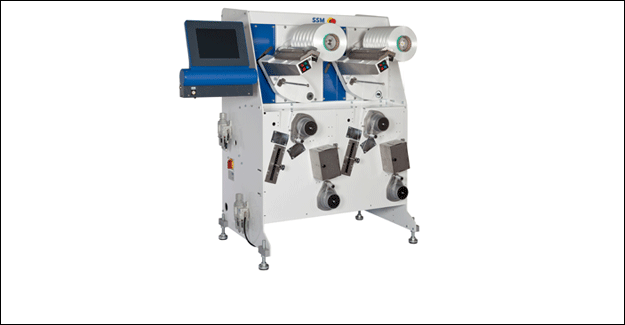Autocoro 8 - Automation becomes more intelligent
Autocoro 8 - Automation becomes more intelligent

The single-drive technology of the Autocoro 8 is catapulting the automation of the rotor spinning mill into a new dimension. This intelligent technology relieves spinning mills of the burden of organisational tasks. Machines with smart, autonomous spinning positions can be integrated far more easily into operating processes than conventional rotor spinning machines. Automatic processes that are stiff and inflexible on beltdriven machines suddenly become adaptable and can be optimised better, enabling companies to attain their goal of maximum efficiency with much less effort.
Smart spinning positions start up faster
Every spinning position on the Autocoro 8 is an intelligently automated, independent production unit with individually controlled spinning and winding processes. The intelligence is there where it is needed: at the spinning position. All Autocoro 8 spinning positions can piece independently. They don't need to wait for a central unit, as on belt-driven machines. The Autocoro thus comprises 552 intelligent production units, which are productive round the clock without exception, even when piecing is required especially frequently at some spinning positions. On start-up the individual automation of the Autocoro also results in an unassailable leap in productivity. The QuickStarter facilitates twelve synchronous piecing processes, meaning that the Autocoro 8 runs up 6 times faster than a comparable machine with a belt drive.
Smart spinning positions show what they're doing
The Autocoro's smart spinning positions communicate with the operating staff. A symbol display at each spinning position shows what the position is doing at any moment. If a malfunction occurs, the display signals what the problem is, so that the operator can quickly rectify the fault without any tedious troubleshooting process. Machines with a central drive have coloured LED signals at the spinning position at best, or fault messages on the central operating screen at the end of the machine. This delays fault elimination and extends the production stoppage.
Flowing lot change in ongoing operation
The Autocoro 8 is the first rotor spinning machine that achieves a flowing lot change entirely automatically. As soon as a spinning position has completed the last package of the first lot, it automatically begins with the next lot - with no manual intervention required. The individual spinning position supports reliable lot separation even when changing cans or spinning components; there is no need to wait for all spinning positions to run out, as on conventional belt-driven machines. Once the last package in the old lot is full, the spinning position automatically adopts a waiting position, indicated by a light signal. The operator can now change the spinning can or component and acknowledge the new batch on the spinning position. Long stoppages and spikes in the workload during lot changing, such as are common on machines with belt drives, no longer occur.
The automatic, intelligent lot separation opens up new possibilities for economical, qualityoriented raw material utilisation in spinning mills, as configuration of the individual spinning position can be adapted automatically according to batch. This makes it possible to achieve a constant yarn quality for each lot at full production capacity with varying raw material quality.
The spinning position knows when the rotor needs to be cleaned
Decentralised automation of the individual spinning positions also prevents pointless work spikes in cleaning processes. The Corolab sensor monitors the yarn quality at each spinning position continuously and so it recognises whether the rotor needs cleaning. Companies can take advantage of this to optimise the length of the cleaning intervals for the rotors, replacing fixed intervals with process-optimised cleaning as required.
PilotSpin - when individual spinning positions change their thinking
The production of trial packages is an expensive business on belt-driven machines, because it always blocks the entire machine length. On the Autocoro 8, the individual spinning position is intelligent and is consequently able to rethink if required and produce trial packages automatically in parallel to production with the aid of PilotSpin. Only a fraction of the machine's productivity is sacrificed in this process. Spinning and winding tests are easy and cost-effective thanks to the intelligent automation of the Autocoro 8 – the testing of new raw materials and the development of new or customised products can be integrated smoothly into spinning mill operation. The outlay on new yarn development is smaller too.
MultiLot - intelligent spinning positions don't just spin in tandem
Spinning several lots calls for a high level of attentiveness from operators. On the Autocoro 8, the individual spinning unit knows which lot it is spinning and automatically rejects incorrect tubes, because the machine is not colour-blind and operates sensor recognition of the tube colours. With MultiLot 5 up to five lots can be produced at the same time, automatically and error-free. Up to three lots can be produced in parallel with MultiLot 3. Many companies use MultiLot 3 to achieve a particularly high productivity level in flowing two-lot alternating mode.
The advantages of single spinning position automation are discernible even in combination with Fancynation. The mostly small fancy yarn lots can be integrated smoothly into the production of large quantities of standard yarn, as not all spinning positions have to operate at the same pace, as on belt-driven machines. A separate fancy yarn lot is quickly set up and runs in parallel without any major impact on the adjacent standard yarn production. This makes production planning considerably easier.
Intelligent automation changes processes
The intelligent automation of the Autocoro 8 will change the production processes in the company. Here Schlafhorst is the pacemaker for the entire industry. It is no longer a question of making formerly manual processes faster and more reliable, but of organising production processes more intelligently in automation terms. Schlafhorst is supporting mill managers with smart automation, making it much easier for companies to operate efficiently and competitively.



 textileexcellence
textileexcellence 







